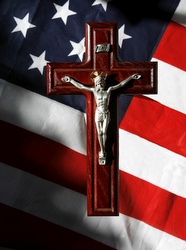
A crucifix and the U.S. flag are seen in this photo illustration. The U.S. bishops’ document “Forming Consciences for Faithful Citizenship,” seeks to provide a blueprint on how Catholic social teaching should affect political participation by Catholics. (CNS illustration/ Karen Callaway, Catholic New World)
Editor’s note: In this letter, the bishops of Wisconsin offer spiritual guidance to help Catholics as they prepare to vote in the 2020 election.
Dear Sisters and Brothers in Christ,
We write to you as our state recovers from a prolonged period of strife. Recent events have revealed just how fragile our lives are and how essential it is to make sacrifices for the sake of others. As another national election season will soon be upon us, we presume that elections too will look different. One constant, however, is our Catholic teaching.
As in the past, we urge you to review “Forming Consciences for Faithful Citizenship: A Call to Political Responsibility” from the Catholic Bishops of the United States (www.faithfulcitizenship.org) and our (accompanying) summary of Catholic social teaching … Both serve to guide Catholics as they exercise their rights and duties as citizens.
We also commend to you Bl. Frédéric Ozanam, a model of what it means to be a faithful citizen. He was a university professor, politically engaged Catholic, and most important, founder of the Society of St. Vincent de Paul. The society this year is celebrating the 175th anniversary of its foundation in the United States. In 1851, during a period of great social and political turmoil, when democracy in France seemed doomed, he wrote: “Let us learn, first of all, to defend our belief without hating our adversaries, to appreciate those who do not think as we do, to recognize that there are Christians in every camp, and that God can be served now as always! Let us complain less of our times and more of ourselves. Let us not be discouraged, let us be better.”
Ozanam showed that our political participation must be influenced by our Catholic faith and not the other way around. May we follow his example, remembering that in the long run, and as his legacy proves, political regimes come and go, but Christian commitment to human dignity and the common good have a lasting impact. Through the exercise of our political responsibility, may we uphold the dignity of the born and unborn, especially those who are destitute, abandoned, oppressed or vulnerable.
In another way, Ozanam has a lesson for our times, for he lived through a terrible cholera epidemic and yet with his friends continued to serve the poor of Paris. Even as we face personal challenges, we are called to look for ways to help those in need. We cannot forget those whose isolation caused by cruelty is constant and will extend beyond a time of pandemic. Now is the time to act on behalf of those who through abortion, xenophobia, racism, poverty and materialism, society fails to recognize as fully human. May we use what we have learned during recent challenges to better model the love of Christ in what we say and do.
We urge Catholics to use this time to engage in prayer, formation, conversation, and action. Now is the time to safely reach out with love, compassion, and understanding, even to those with whom we may disagree. Please also consider aiding those who cannot vote due to fear or circumstance. Help them to learn about candidates and how to safely cast their vote. For complete information on voting options and assistance, including absentee voting information, please visit https://myvote.wi.gov/.
We thank you for reading this. May God bless you, and may he help us rebuild a more just and loving society.
Sincerely yours in Christ,
Most Rev. Jerome E. Listecki Archbishop of Milwaukee
Most Rev. David L. Ricken, Bishop of Green Bay
Most Rev. Donald J. Hying, Bishop of Madison
Most Rev. William P. Callahan, OFM Conv., Bishop of La Crosse
Most Rev. James P. Powers, Bishop of Superior
